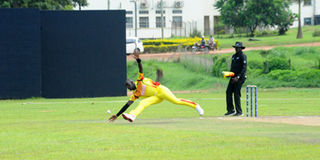Perfect storm sweeps away Cricket Cranes’ T20 chances

Extreme focus. Uganda’s left-arm seamer Charles Waiswa attempts to stop a run in between the wickets against Namibia at the University Oval in Kyambogo. Photo by Eddie Chicco
What you need to know:
- Comment. The true index of the eruption of anger was not the slim margin of defeat, which was just the odd run. The grandstand finish might have left Ugandans numb with grief, but the perfect storm that created untold paralysing horror wasn’t lost on many.
- Existential threat. Brian Masaba always goes into the midst of opposing teams and dares them to do their worst. Many a time he emerges with his reputation intact, yet this hasn’t ring-fenced a place for himself in the Cricket Cranes’s XI. His presence is seen to pose an existential threat to the balance of the team.
A perfect storm this past week battered Uganda’s chances of securing a ticket to the global qualifier of next year’s ICC T20 World Cup. While the near-invincibility of Namibia was less of a shock and more of a troubling inevitability, the depths that hosts Uganda plumbed proved deeper than expected.
The Cricket Cranes found themselves on a downward spiral without any possibility of recovery after successive defeats at the hands of Namibia and the old foe, Kenya. The loss against Kenya got a bad rap, and deservedly so. The true index of the eruption of anger was not the slim margin of defeat, which was just the odd run. The grandstand finish might have left Ugandans numb with grief, but the perfect storm that created untold paralysing horror wasn’t lost on many.
Take the overthrow from Frank Nsubuga that brought a well-set batsman back on strike to face the final delivery of Kenya’s innings. Rakep Patel obliged with one big final successful assault. That six would prove telling probably as much as the decision not to introduce Henry Ssenyondo into the attack.
A perfect storm such as this meant that -- just like the fading of afternoon into evening -- Roger Mukasa’s captaincy risked attracting a charge of recklessly flying in the face of that that is exceptional in intelligence. It barely helped matters that the 29-year-old admitted sticking Kenya in would have been his preference had Cricket Cranes won the toss. Or that he hasn’t looked like a colossus in the top order for what seems like eternity.
It invariably follows that the question about the captaincy adding deadweight to Mukasa’s feeble shoulders will be posed. The breadth of issues a cricket captain has to address is typically daunting. This is why they tend to be revered and reviled in almost equal measure. Sadly for Mukasa his captaincy has disintegrated with catastrophic results. This has meant that he’s come in for a drubbing, being reviled a lot more than revered. Attacks against his captaincy grew in both their frequency and ferocity during this past week’s ICC T20 World Cup Africa Qualifier on home soil.
Although Mukasa is never one to back down in the face of a threat, fears of reactions (with a tone that is as patronising as it is disparaging) to his dip in form being detrimental aren’t baseless. So probably the powers that be will earn both the affection and admiration of key stakeholders when they extricate Mukasa from the captaincy’s dark embrace. Yet the unimpeachable voices out there seem drunk with fear and dismay at the absence of competent replacements.
The captaincy requires a depth of imagination, ambition and sheer determination which seems to elude many. But maybe not Brian Masaba. The all-rounder is such a physical and intellectual presence. He always goes into the midst of opposing teams and dares them to do their worst. Many a time he emerges with his reputation intact, yet this hasn’t ring-fenced a place for himself in the Cricket Cranes’s XI. His presence is seen to pose an existential threat to the balance of the team.
Recent performances have, however, stoked the chorus for a change in heart. Probably all this mess, which make no mistake can’t be wished away, would not see the light of day if a pragmatic approach was used to select a team. A special training programme for players like Shahzad Kamal, David Wabwire and Davis Karashani who are bogged down by either work or academic conditions can be carved out.
We cannot cling onto a one-size-fits-all approach. Karashani would certainly help with the captaincy whilst Kamal would let the likes of Dinesh Nakrani and Riazat Ali Shah go into beast mode with bat. Lastly, we are too destitute to let injuries bordering on being a figment of one’s imagination shut out gems like Kenneth Waiswa. Enough with the perfect storms!




